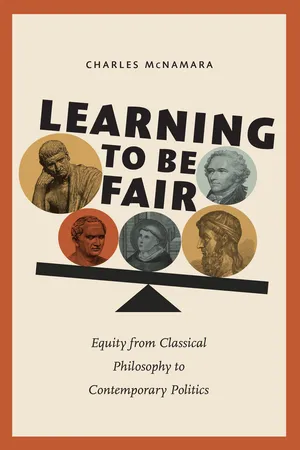
Learning to Be Fair
Equity from Classical Philosophy to Contemporary Politics
- 176 pages
- English
- ePUB (mobile friendly)
- Available on iOS & Android
About this book
The language of "equity" saturates our contemporary culture. Human-resources departments lead workshops on "diversity, equity, and inclusion." Progressive politicians promise "equity" in everything from housing to healthcare, while their conservative counterparts decry "equity" as a modern invention and a rejection of classical, Western culture's moral principles. Learning to Be Fair shows that nothing undermines that objection more than reading the foundational texts of Western moral philosophy.
Despite its newfound popularity (or infamy), the concept of equity is in fact one of the oldest, most durable principles of Western ethics. In Learning to Be Fair, Charles McNamara excavates the ancient origins of equity in classical Greek and Roman thought and traces their influence on lawyers, philosophers, America's Founding Fathers, and our contemporary culture. He shows how this history connects current debates about the role of equity to long-standing ethical questions about civil disobedience and the possibility of teaching people to be good.
Tools to learn more effectively

Saving Books

Keyword Search

Annotating Text

Listen to it instead
Information
Table of contents
- Cover
- Title
- Copyright
- Contents
- Acknowledgments
- Introduction
- 1. The Soft, Leaden Rule
- 2. The Roman Refashioning of Equity
- 3. Revolutions in Equity
- 4. Modern Equity—Critics and Contraries
- 5. Learning to Be Fair
- Conclusion
- Notes
- Bibliography
- Index
Frequently asked questions
- Essential is ideal for learners and professionals who enjoy exploring a wide range of subjects. Access the Essential Library with 800,000+ trusted titles and best-sellers across business, personal growth, and the humanities. Includes unlimited reading time and Standard Read Aloud voice.
- Complete: Perfect for advanced learners and researchers needing full, unrestricted access. Unlock 1.4M+ books across hundreds of subjects, including academic and specialized titles. The Complete Plan also includes advanced features like Premium Read Aloud and Research Assistant.
Please note we cannot support devices running on iOS 13 and Android 7 or earlier. Learn more about using the app